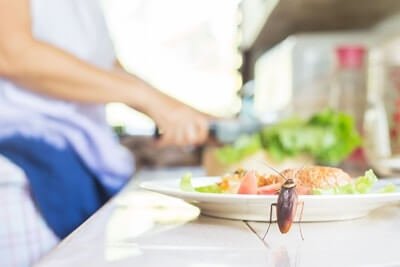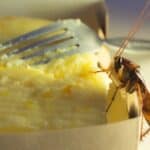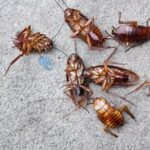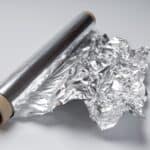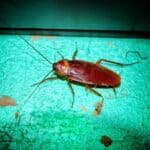It can seem wasteful to throw food away if you find a roach in a large container. This can leave you wondering if it’s bad to eat food that a cockroach has crawled on. If you’re healthy and the roach left no discernable traces, surely it’ll be fine. However, this may not be the case.
Never eat food that cockroaches have touched. Roaches carry a host of bacteria and diseases because they eat and walk through decaying matter. When they crawl on your food, they can transfer allergens, illnesses, mold spores, decay, and poison. This can make you ill, especially if you’re in a vulnerable risk group. Symptoms include food poisoning, the flu, or diseases, like hepatitis.
With that said, people with strong immune systems can fight off the effects with no symptoms at all. That doesn’t negate the danger, however. If you find a roach in your food, don’t take the risk of eating it. Just dispose of it safely.
What Happens If A Roach Crawled On Your Food?
Following contact with your food, a roach may not affect it. Roaches are not inherently toxic or able to produce harmful substances from their bodies. However, they do consume rotting or unsanitary foods, which may include:
- Decomposing animal or insect bodies
- Poop
- Mold
- Dead skin cells
- Rotting food in your kitchen
In the process of walking through and consuming these materials, roaches become coated in the substances. They can carry around:
- Bacteria
- Fungus
- Viruses
- Allergens
- Spores
If a roach wanders through your dinner plate or weeds its way into your plastic Tupperware, then it may have smeared these substances all over your food. When you eat the contaminated food when it’s finished, you’re then ingesting the trace bits of poop, decay, or mold yourself.
Can I Eat Food Touched By a Cockroach?
Unless the roach pooped in the food, you likely wouldn’t notice that they’d been there. If you did happen to watch the roach scurry off your food, you might be conflicted. Why waste food? If you inspect the plate for signs of contamination and find none, will you be okay?
Unfortunately, you won’t be able to tell how much bacteria is left behind by a roach. Likewise, you can’t tell what types of bacteria or harmful substances are present. Unless you submit the food for inspection by a microbiologist, you’re out of luck. When you eat the food, you may never learn exactly what you’ve just put in your body.
For the average, healthy person with a strong immune system, you may be fine. Your body might be capable of fending off the bacteria, mold, or allergens that have just been introduced to your system. You may not experience any negative effects and continue your life as normal. However, that’s only one possible outcome. You can’t be sure how your body will react until it’s too late. This outcome is only possible if:
- The roach, by some miracle, is very clean.
- Your body can fend off the viral or bacterial infection.
- The types of contingents that infected your food are benign or more easily processed by your body.
If these factors – all three, or individually – are not present, you can get sick.
What Diseases Do Roaches Carry?
In a study published in the International Journal of Scientific Research, roaches were observed to carry various bacteria, parasites, and fungi strains.
The researchers even discovered that cockroaches transmitted exotic viruses, like hepatitis. The most common fallout you’ll experience from consuming a dirty cockroach (or food it’s touched) is an intestinal disease. These can include:
- Cholera
- Dysentery
- Typhoid fever
Those are the rarer and more extreme cases. For most people, you’ll notice a roach has contaminated you once you experience symptoms of:
- Food poisoning
- Flu, or flu-like symptoms
- Diarrhea and vomiting
It’s worth noting that cockroaches are not actively harmful but passively harmful. In the scientific world, they are referred to as ‘passive’ or ‘mechanical vectors.’ This means that, on their own, cockroaches do not contribute to illness and disease. As a matter of fact, many cultures worldwide eat roaches as part of their diet.
However, the roaches crawling in sinks and pantries are a different story. You can easily get sick from exposure to what these bugs carry.
Can You Die From Eating A Cockroach?
In heavily infested homes, a roach can get into your food without you noticing. However, eating a roach is no more dangerous than eating food that a roach has been on. It’s not good news, but you don’t need to panic. It does not mean certain and immediate death for three reasons:
- Rarely are intestinal diseases immediately fatal. You should have time to seek medical treatment.
- Cockroaches rarely carry untreatable illnesses. The substances that roaches walk through are not the type to contain untreatable diseases.
- Cockroaches are small and can only carry so much bacteria. While every bit counts, it’s unlikely to give you a fatal dose of anything.
It’s not impossible to die from eating a roach or food a roach has touched. The most important element is timing. If you do contract an illness and refuse to seek treatment, the condition can worsen. You are more likely to die from complications caused by the sickness rather than the sickness itself. You may also be in more danger if:
- Immunocompromised
- Elderly
- A child
- Allergic to cockroaches
- A preexisting condition that makes you vulnerable to illnesses
- Have asthma
Allergens, Asthma, And Children
According to Allergy, if a child is sensitive to cockroach allergens, they’re more likely to develop asthma than other children.
On their own, cockroaches can induce breathing difficulty, especially if you already have asthma. This is not only due to the bacteria on cockroaches but the exoskeletons themselves. This is only worsened for adults with existing allergies. Without asthma, a cockroach allergy may also cause a strong negative reaction. This could include:
- Difficulty breathing
- Shortness of breath
- Coughing
- Your skin breaking out in hives
- Swelling
Poison Bait And Bug Sprays
Commercial bug poison is known as lethal to humans. A roach may be covered in poison for two reasons:
- From baited traps, either in your home or a neighbor’s home (if the roach has traveled)
- Pest control methods, such as bug bombs or bug spray
If you ingest this poison second-hand through a roach, you may be in danger. The poison could rub off on your food as the insect traipses through it. If you consume the entire roach by accident, the dose may be even higher. Be sure to look for symptoms, as signs of poisoning include:
- Dizziness
- Lack of concentration
- Confusion
- Abdominal pain
What To Do If You Eat A Roach By Accident
It’s not the cockroach that is fatal, but the bacteria and how you combat it. Even in the worst cases, it should not result in immediate death. Most bacteria will take some time to manifest. You will have time to address it.
If you believe that you ate contaminated food, keep an eye on any abdominal pain and additional symptoms. Should you feel any debilitating pain, it’s always wise to call a medical professional. It doesn’t matter if you believe your pain is due to eating contaminated food.
If you are in a risk group, it’s recommended to contact your doctor immediately. You may need treatment to get ahead of any upcoming illness.
For a healthy person, the reaction will generally be diarrhea, vomiting, and then full recovery. If symptoms persist for more than two days, you should seek medical attention. This is also true if you:
- Develop more severe symptoms
- Become dehydrated
- Your vomit or diarrhea are unusually colored or contain blood.
Nasty strains of bacteria can make you ill. You may be out for a couple of days or, at worst, require hospitalization. No matter your state of being, if you’re concerned, then seek medical attention anyway.
Accidentally Drank Water With Cockroach
You may wonder if water is more easily contaminated than food. After all, food is only infected in places where the roach has walked. Water, however, should spread around the contingents.
Contaminated water is just as dangerous as contaminated food. Your body should be just as able – or unable – to fend off the contaminants.
With water a cockroach has touched, you are unlikely to die. There is a chance that you will develop diarrhea and vomiting. Unless you are in a risk group, you may not develop any symptoms at all.
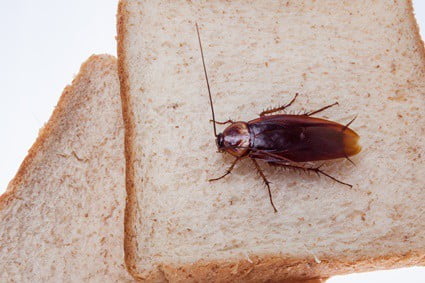
What Happens If You Eat Cockroach Poop?
Cockroach poop is a common sign that you have an infestation in your hands. Unfortunately, for bad infestations, cockroach poop may actually get into your food. It doesn’t help that cockroach poop can easily blend into some meals.
Cockroach poop appears as small, brown, or black specs. Depending on the species, it can come in different sizes. Some are in the shape of large coffee grains or finely ground pepper. Larger species, like the American cockroach, often leave waste that’s shaped like a cylinder.
Just like the cockroach itself, roach poop can be filled with different viruses and bacteria. However, it’s no more deadly than accidentally eating a roach or its contaminated food. Just like the previous examples, keep an eye out for symptoms. You should seek your doctor’s advice if you’re concerned.
When Can You Safely Eat A Cockroach?
In many world cultures, cockroaches are an integral source of protein, along with other insects. Likewise, roaches have been used in traditional medicine, even in modern-day China.
If you are still grossed out by eating roaches, consider the fact that you may have already eaten a few yourself. The FDA allows insect fragments, including cockroaches, inside commercial products like coffee and chocolate. Specifically, the FDA allows 60 or more insect fragments per 100 grams of chocolate. In coffee, the FDA allows 10% or more insect fragments.
Note that this isn’t simply a matter of oversight or negligence. In factories where conditions are desirable to roaches, it is hard to keep them completely roach- or insect-free. There is always the chance of roaches getting into production, no matter how hard anyone tries to remove them.
Likewise, products like coffee and chocolate come from natural sources. Where there is nature, there are roaches. It will be hard to remove insects from harvests. This would mean manually inspecting every coffee and chocolate bean.
The only viable way for these products to be completely roach-free is to make them out of synthetic materials. However, that is definitely more harmful to your body than eating a few insect fragments.
In fact, there are no known reports of someone falling sick from eating insect fragments in commercial products. That’s because the insects that come with these products often arrive directly from farms. These places are kept bacteria- and virus-free.
What To Do If You Find A Cockroach In Your Food
If you suspect roaches have been in your food, throw out any food in the container. Dispose of any other food that the roach may have landed on. Eating this food accidentally may not make you sick right away. However, eating it on purpose – especially more than once – does increase your chances of growing ill.
If you find a roach in your food, you should also look for signs of an infestation. This includes:
- The presence of droppings.
- Regularly seeing roaches, especially during the day.
- Bite marks in your food containers or plastic baggies.
How To Keep Cockroaches Away From Food
An infestation can be hard to deal with. More often than not, it takes a long time to disappear. However, there are ways to keep roaches out of your food.
Avoid Thin Plastic Containers
Cockroaches can bite through plastic bags or thin plastic containers. If you notice any signs of tampering with the storage items for your food, throw them away. The food should be disposed of, and new containers with thicker plastic should be used.
Keep Your Food Airtight
Cockroaches can sneak through the smallest of gaps. Be sure to store food in airtight containers, so they can’t gain access. This will also prevent tempting food smells from wafting to any nearby roaches. That makes it more difficult for the insects to seek out your food or contaminate it.
Don’t Leave Out Food
After dinner, it’s easy to leave extra food on plates in the kitchen. You may intend on coming back to them. Aside from that, you may leave an uncovered pot or pan on the stove so guests can enjoy second helpings. Unfortunately, all of this leaves food as an open invitation to roaches.
Be sure to cover any pans or pots if they’re left on the counters. Likewise, you should immediately throw out leftover food or store it away.
Clean Up Spills And Crumbs
Of course, keeping your food inside containers isn’t going to work if the area around it still has remnants. For this reason, it’s wise to clean up spills and crumbs as soon as they occur.
Also, get in the habit of sanitizing your kitchen and dining areas at least before going to bed. Doing so will remove food odors. This lessens the chances of attracting roaches into your food.
Inspect Your Fridge
While it may seem horrific, roaches can and do make homes inside your fridge. That is why it’s smart to inspect your fridge for roaches regularly. Keep the inside of your fridge clean. Be sure to wipe away spills and remove any expired food. This makes it more difficult for roaches to access the food.
While you should never intentionally eat food that’s been contaminated by cockroaches, you don’t need to worry too much. Instead, limit how much access this pest has to your food. If they’ve traipsed through a plate of food or snuck into a food container, throw it away.
